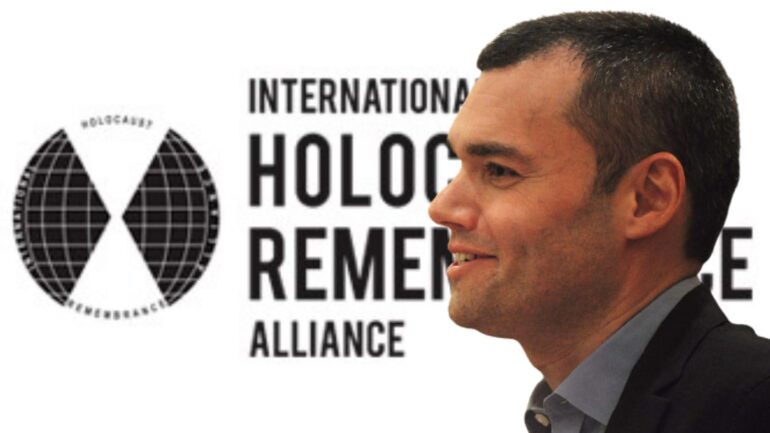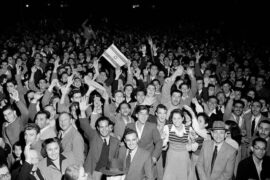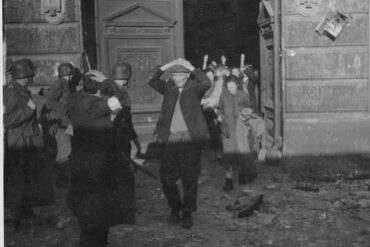As newly elected US President Joe Biden takes the stage, the recurring debate over a legal definition for anti-Semitism as it relates to the State of Israel has returned in full force.
As “Pro-Israel” groups push for a legal standard of anti-Semitism, systematized by the International Holocaust Remembrance Alliance (IHRA), voices across the political spectrum for civil rights, academic and economic freedoms, and the Palestinian people, among others, oppose the definition on different grounds.
Most recently, Peter Beinart, a leading progressive American Jewish voice on Israel, publisized a criticsm of the IHRA’s seventh of eleven “contemporary examples of contemporary anti-semitism” which involves “Denying the Jewish people their right to self-determination, e.g., by claiming that the existence of a State of Israel is a racist endeavor.”
Beinart’s critique challenges the necessity of a national state in order to attain a meaningful level of self-determination, noting that in the absence of a “two-state solution,” a Jewish state necessarily inhibits Palestinian self-determination, and that “National self-determination can only constitute a universal right if it means something less than independent statehood.”
But while accurately identifying the complexities of national self-determination, Beinart’s ultimate conclusion characteristically lacks political imagination necessary to address such a challenge. Beinart asserts that “the only way to respect both the Jewish and Palestinian rights to national self-determination is to define that right as autonomy… in a binational state that gave each the authority to preserve its language and culture.”
Yet, the idea of a binational state holds little promise for a lasting solution in a region marred by decades of internal conflict fueled by countless foreign interests and influences.
For starters, his examples of functioning modern binational states hold little relevance to Israelis or Palestinians. Ignoring the ebbs and flows of support for Quebecois independence, both Anglophone Canadians and Francophone Canadiens must confront their settler-colonial histories and legacy of violence against First Nations before asserting any unique claim to sovereignty.
In Belgium, the convenient geographic division into Flemish and Walloon regions, each bordering the Netherlands and France respectively, and with open trade and travel throughout the European Union approaches a more creative solution, but ultimately the shared European and Catholic heritage, and the general erosion of European national identities in the post-World War II era greatly diminish the relevance of Belgium as a role model for a future Israeli-Palestinian state.
Ultimately, our own traditions and history present a much more compelling approach than the tired Western model of centrally managed states. First and foremost, we must look to the rise of Hebrew sovereignty in Eretz Yisrael following the Exodus from Egypt. Despite successfully taking control of the land within decades of crossing the Jordan, neither Yehoshua nor his successors established a unified state for almost 400 years.
In fact, this week’s parsha, Yitro, describes the process by which the first Hebrew system of self-governance developed. Coming from the centralized monarchical Egypt, Moshe saw it as his responsibility to act as judge for every dispute that arose within the nation. But when his father-in-law Yitro joined the nation in the desert, he recommended that Moshe institute a far more diffuse system, by which the nation would be divided into tens, fifties, hundreds, and thousands, with appointed leaders for each level of division that would serve as the judge for their own constituency.
It is likely that Yitro learned the importance of decentralization from living in Midian, where the national leadership was described by the Torah (in Bamidbar chapter 22) as a council of tribal elders. In Parshat Yitro, Moshe agrees to Yitro’s recommendation, and from then on, until the ascension of Shaul, the nation was led and judged by local leaders, with only the broadest and most complex matters being brought before higher levels of leadership.
We can find further prioritization of localized government in our daily tefillot. In the Amida, as we walk through the steps of our national redemption in our requests to HaShem, we first request a restoration of our shoftim, our local systems of justice, and only after continuing through various other stages of redemption, including the full restoration of Jerusalem, do we mention our desire for the restoration of the Davidic monarchy.
All of this is to say that, despite the amazing accomplishments of a modern, centralized Israeli state over the past seven decades, it may be necessary to develop local autonomous zones, led through a more diffuse system of participatory democracies and based on merit, rather than a centralized representative democracy that naturally inclines towards sharp sectarian divisions, such as the current national political crisis.
Such a system also holds great promise for a more just realization of both Hebrew and Palestinian desires for self-determination. Localized autonomy provides an opportunity for ḥaredi and national religious communities to create their own systems of self-government. Similarly, secular Israelis and Palestinians of diverse religious and political persuasions can govern themselves according to their desires, and realize their dreams of self-determination, not in something “less than independent statehood” as Beinart puts it, but in something far more liberating and politically fulfilling than the western model of nation-states.
Skeptics may raise challenges about national interests, most prominently, national defense. After all, the nation’s primary reason for demanding a king at the end of the age of Judges was to overcome the military threat of the Philistines. Ultimately, the advent of the Abraham Accords, and the thawing relationships between Israel and its neighbors presents great promise.
If Palestinians were given a genuine sense of self-determination through local autonomy, and if decades of government-sponsored animosity from the rest of the Middle East continues to erode, the immediate domestic and internationally military threats evaporate. At that point, larger threats such as Hezbollah and Iran would have to show their true colors. They could either accept that Israel has realized its obligations to create a just reality for all resident of Eretz Yisrael and join an expanding network of regional solidarity and cooperation, or face the combined might of the Arab world, in a unified front across religious and political boundaries.
Ultimately, Beinart is correct in asserting that we need to explore new approaches to our national political organization. And the IHRA is wrong in its assertion that the Jewish people need a European-style nation-state in order to express our national self-determination. But rather than looking at the nations of the world for a better way, we must turn inwards, towards our history and our traditions, and let them guide us towards establishing a more just society in our land, for all of its inhabitants.





